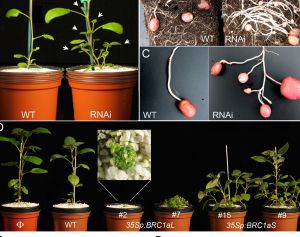Researchers at the National Centre for Biotechnology (CNB-CSIC) recently determined how potato, tomato and aubergine plants adapt to environmental characteristics by forming more or fewer ramifications on their stems. The study, published this month in Current Biology, indicates that two different BRC1a gene products that arose about 19 million years ago are responsible for this function.
Pilar Cubas, a scientist in the Plant Molecular Genetics Department of the CNB and one of the authors of the study, explains that the BRC1a gene evolved in such a way that its messenger RNA encodes two proteins with opposite functions. "The BRC1aL variant inhibits formation of new branches, while BRC1aS binds to and sequesters BRC1aL to prevent it entering the cell nucleus to do its job," explains the researcher.
When in the light, the plant produces more BRC1aS to facilitate branch formation, while in the dark, the BRC1aL form prevails and prevents the growth of new branches. Phytohormones such as auxin, or the proximity of other plants that compete to capture the red light needed for photosynthesis, also modify the proportion of the two variants and thus, the appearance of new branches.
"Environmental changes govern the proportion of these two proteins. In the case of potato, this ratio controls the number of branches and stolons (runners) - subterranean branches that give rise to the tubers. This allows them to adapt better to the environment", says Cubas.
This mechanism arose due to a small change in the DNA of the family Solanaceae 19 million years ago, after the evolutionary separation of the genera Capsicum (peppers) and Solanum (to which the tomato, potato, and aubergine belong). This change in a single DNA base has allowed the genus Solanum to adapt better and more rapidly to changes. "It is an evolutionary advantage that has given them greater success in fluctuating conditions," the author concludes.
- Nicolas et al. A Recently Evolved Alternative Splice Site in the BRANCHED1a Gene Controls Potato Plant Architecture. Current Biology (2015), http://dx.doi.org/10.1016/j.cub.2015.05.053






